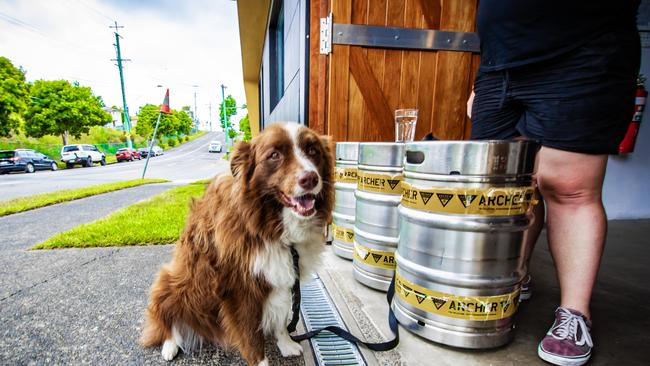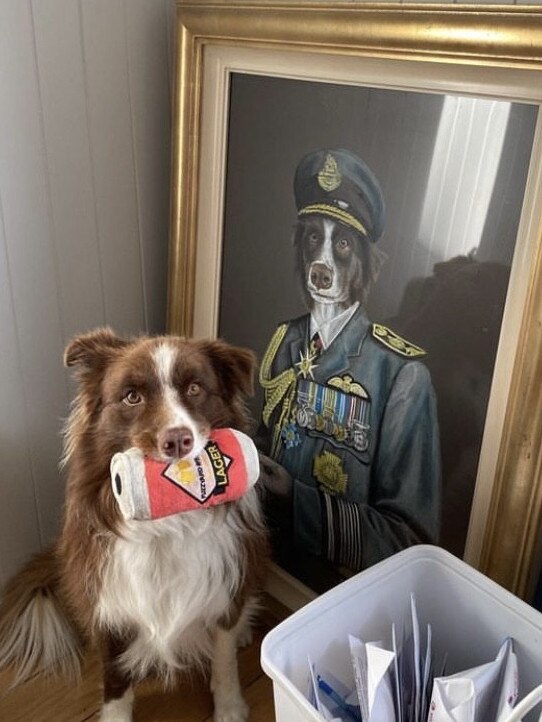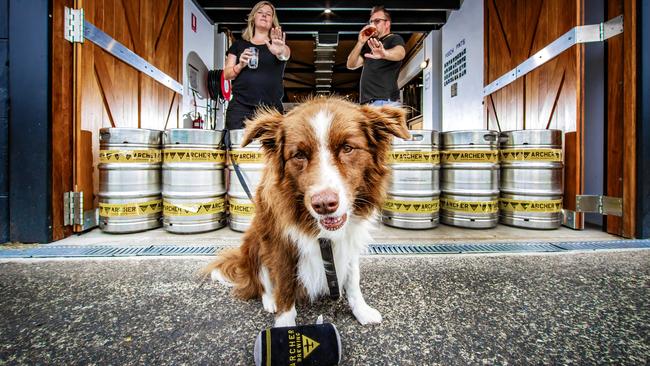No dogs allowed: Brisbane brewery fights to welcome man's best friend
The owners of a Brisbane brewery, with a dog for a mascot and namesake, are fighting to change state and federal laws that ban canines from inside a venue that serves food. HAVE YOUR SAY

City Beat
Don't miss out on the headlines from City Beat. Followed categories will be added to My News.
The owners of a Brisbane brewery, with a dog for a mascot and namesake, are fighting to change state and federal laws that ban canines from inside a venue that serves food.
The trouble began for Archer Brewery in Wilston in November, when a complaint was made to Brisbane City Council, concerning dogs in areas where food is handled.

Under the Food Standards Code, animals are not allowed in areas where food is handled or served. The only loophole is that a business can allow dogs in outdoor dining areas.
The brewery has been negotiating with council officers, with the owners desperate to have their pet dog, Archer – who the brewery is named after – allowed back onto the premises.
But Archer Brewing co-owner Lucy Martin said the options on the table for the business to become compliant with the Food Standards Code are impractical.
“They (council officers) said the entrance way could be a place just for dogs, but that means everyone will have to walk past the dogs, and you’re confining all of the dogs to quite a small space,” she said.
“They also suggested outside dining, but they were the ones who said we couldn’t have streetside dining initially because we are right next to a busy road (Newmarket Road).
“Or they said we could do modifications. If we removed an exterior wall and made it a bi-fold door, that would make it an outdoor space.
“But we’re talking about the structural integrity of a building that was built in the 1940s, which means a lot of money, and we only rent this space.”

Ms Martin launched a change.org petition to change the rules. This would either need to be done at a state level under the Food Act 2006, or federally through the Food Standards Code.
“The law talks about ‘food handling areas’ and we assumed it only meant places where food is physically handled, but it includes ‘servery’ and that is the dining area,” she said.
“We need to get that word ‘servery’ adjusted because when you boil down to the reasoning behind it all, it’s all so outdated – it’s all about preventing the passing of disease.”
Ms Martin is advocating for venue owners to be given some discretion in the matter.
“We want to make it so that allowing a dog inside a venue becomes a venue owner or manager’s choice,” she said.
“We do not wish for dogs to enter any food preparation areas, or be near them, nor are we requesting they be given the right to enter every venue, but venue owners and managers should be able to decide, not a governing body.
“We want Australia to reflect more modern and up to date opinions on dogs as members of the family, not simply pests that harbour diseases.
“While some may not want to eat with dogs, which is perfectly fair, they can choose to go elsewhere, or to areas within venues that dogs can’t go.
“Within our own venue, would we make (the) upstairs (level) completely dog free.”

Brisbane City Council’s Civic Cabinet Chair for City Standards, Councillor Kim Marx, said the brewery’s petition raised “real questions” about “common sense changes”.
“I think there’s real questions about whether common sense changes to the State and Federal food laws are needed to improve the current one-size-fits-all-approach,” she said.
“There should be room for venue owners to have some flexibility as to where people can take their four-legged friends in enclosed dining areas.
“With commonsense Federal and State laws, Council would be able to work with local businesses to help them find areas at their venues where dogs can go.”
A Queensland Health spokesperson said the state’s Food Act 2006 is based on the national Food Standards Code, which is ultimately administered by local councils.
“The Food Act 2006 adopts the Australia New Zealand Food Standards Code (the Food Standards Code). Standard 3.2.2 of the Food Standards Code sets out requirements for animals and pests in food premises,” the spokesperson said.
“The administration and enforcement of Standard 3.2.2 of the Food Standards Code is the responsibility of Local Government (councils), not Queensland Health.”

A Food Standards Australia New Zealand spokesman said anyone can submit an application to FSANZ to change the Food Standards Code.
“On the subject of dogs to be permitted in cafes, an applicant must provide information requirements regarding food safety as detailed in the Food Standards Code under Chapter 3. The relevant requirements can be found in Chapter 3.7 of the Handbook,” the spokesman said.
“While there is no regular review of the Code as a whole, FSANZ can initiate proposals to review, amend or develop standards in the Code. For Chapter 3 standards this would typically be in response to addressing a food safety concern.”
The Courier-Mail understands Green Beacon Brewing in Teneriffe has encountered similar issues to Archer Brewing.
The microbrewery which operates within a warehouse used to welcome four-legged friends, which has since changed their stance.
Frustrated patrons raised this policy change in online reviews of the business, to which Green Beacon Brewing replied that it was due to “Brisbane City Council requirements”.
The Courier-Mail contacted Green Beacon Brewing for additional comment, but they declined.




